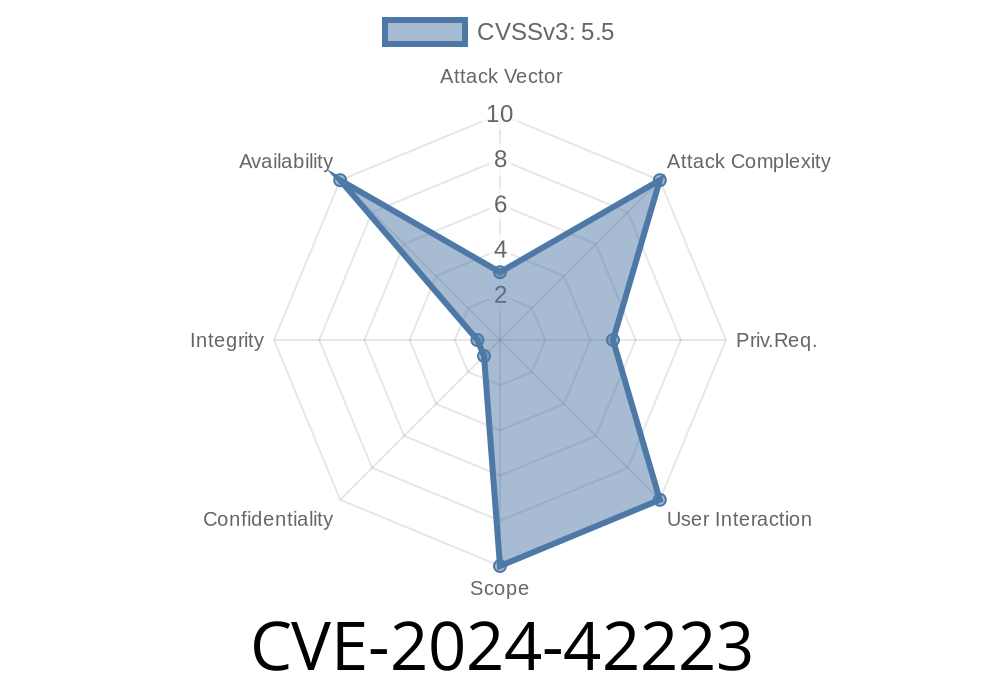In June 2024, a significant kernel vulnerability called CVE-2024-42223 was disclosed and patched in the mainline Linux kernel. This flaw, found in the media driver's DVB-frontend module, specifically the tda10048 chipset, is an integer overflow bug that can potentially destabilize the system or create exploitable conditions for attackers. This post gives you a simple, thorough explanation of the bug, how it can be exploited, hands-on code snippets, and pointers to the official patch.
Background: Where’s the Bug?
Digital Video Broadcasting (DVB) devices, like TV tuners, use dedicated frontends in the Linux kernel, and tda10048 is one such hardware frontend driver. It’s responsible for handling the math that sets up frequency synthesizers, often relying on math operations involving hardware parameters such as crystals (xtal_hz) and multiplier factors (pll_mfactor).
The buggy code more or less looks like this (simplified)
// Inside tda10048_set_params()
u32 xtal_freq = state->xtal_hz; // could be up to 16,000,000 (16 MHz)
u32 factor = config->pll_mfactor; // a smallish multiplier
u32 vco_freq = xtal_freq * factor; // Oops! This can overflow
If both xtal_hz (crystal frequency) and pll_mfactor (multiplier) are set such that their product exceeds 2^32 (4,294,967,295), the value will wrap around—causing unexpected behavior or even hardware misconfiguration.
Reference
- Upstream commit patch
- Kernel mailing list discussion
System instability. Malfunctions in the driver could hang or crash kernel threads.
- Privilege escalation. If attackers can control xtal_hz or pll_mfactor through IOCTLs (user-kernel communication), they can overwrite hardware or kernel memory in some (very rare) cases.
Example Exploitation Scenario
If a malicious local user is able to open /dev/dvb/adapterX/frontend and send IOCTLs to set frontends with very large xtal_hz or pll_mfactor values, they could try to cause an integer overflow and unpredictable device state.
Here’s some pseudo-Python code, exploiting the bug by feeding extreme values (assuming no sanity checks at the IOCTL level):
import fcntl
import struct
# Example values to overflow a 32-bit int
xtal_hz = xFFFFFFF # 4,294,967,280 (large)
pll_mfactor = x10 # 16 (multiplier)
# ioctl number and struct vary based on kernel version and device. Hypothetical struct:
dvb_frontend = struct.pack('<II', xtal_hz, pll_mfactor)
with open("/dev/dvb/adapter/frontend", "wb", buffering=) as dvbdev:
fcntl.ioctl(dvbdev, xC0406F4C, dvb_frontend) # Replace with proper IOCTL
# System may crash, device could misbehave
> Note: Real-world attacks are limited due to permission checks (normally only root or video group users have access). But buggy or 3rd-party apps, or those running as elevated users, could poke this vulnerability.
The Patch: Fixing the Bug
The official fix simply uses a 64-bit integer to hold intermediate calculations, so the multiplication does not overflow, and cleans up results before passing them to hardware.
Patch Diff (excerpt)
- u32 vco_freq = state->xtal_hz * config->pll_mfactor;
+ u64 vco_freq = (u64)state->xtal_hz * config->pll_mfactor;
Full Fixed Code Snippet
// The safe way: use 64-bit calculations
u64 vco_freq = (u64)state->xtal_hz * config->pll_mfactor;
// Downcast safely if needed, after checks
if (vco_freq > MAX_HARDWARE_LIMIT) {
dev_err(&client->dev, "vco_freq too high: %llu\n", vco_freq);
return -EINVAL;
}
u32 hardware_value = (u32)vco_freq;
How to Protect Yourself
- Update your kernel. If you use hardware with the tda10048 frontend, get kernel version 6.10 or later (or any with the patch applied).
- Restrict device access. Allow only trusted users or processes to use /dev/dvb/adapter*/frontend*.
References
- Official patch commit on kernel.org
- Kernel patch discussion on lore.kernel.org
- CVE Details for CVE-2024-42223 *(if available)*
Conclusion
CVE-2024-42223 serves as a classic reminder: even simple math in kernel space can introduce high-impact bugs, especially when dealing with hardware values. The fix here was simple, but the potential risk demonstrated why continuous code auditing and type safety are mission-critical in kernel development.
Timeline
Published on: 07/30/2024 08:15:07 UTC
Last modified on: 08/02/2024 14:24:48 UTC
